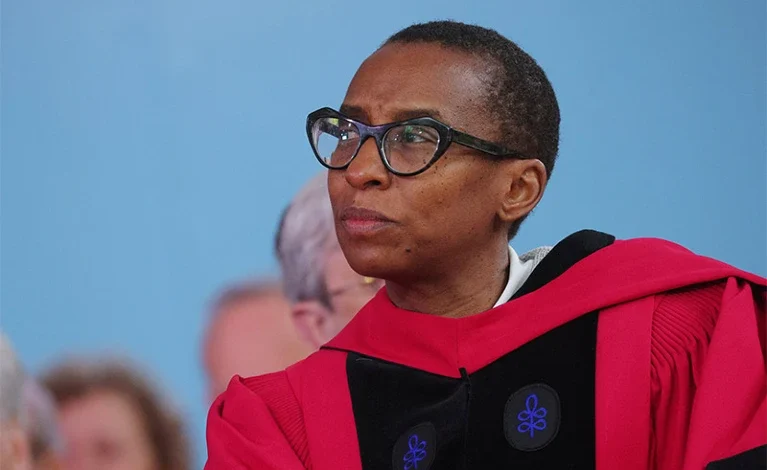Harvard president’s resignation amid plagiarism allegations leaves academics reeling
Claudine Gay steps down in the face of intense scrutiny following controversial congressional testimony about antisemitism on campus.
The resignation yesterday of Claudine Gay, the president of Harvard University in Cambridge, Massachusetts, has shocked many academics. Hundreds of faculty members had rushed to her defense after controversial testimony she gave before the US Congress about the university’s handling of antisemitism in response to the Israel-Hamas war. But mounting allegations of plagiarism in her scholarly work ultimately cut her tenure short on 2 January.
Gay, a political scientist who focuses on Black politics and was the first Black president of Harvard, did not address the allegations in her resignation letter, submitted “after consultation” with members of Harvard’s primary governing board, known as the Harvard Corporation. “It has been distressing to have doubt cast on my commitments to confronting hate and to upholding scholarly rigor — two bedrock values that are fundamental to who I am,” she wrote, “and frightening to be subjected to personal attacks and threats fueled by racial animus.”
Although plagiarism experts consulted by Nature say there are legitimate concerns about how and whether Gay cited the work of others in her scholarly papers, some of her supporters have continued to stand by her side, arguing that the alleged infractions are minor and that the scrutiny is rooted in racism and political opportunism.
Ryan Enos, a political scientist at Harvard, has no doubt that racism played a role, but says that the allegations of plagiarism cannot be ignored. Unfortunately, Enos adds, “she was essentially run out by a mob before we got to have any kind of transparent and independent investigation”.
On 2 January, the board accepted Gay’s resignation. It said in a statement that, although Gay had “acknowledged missteps and has taken responsibility for them”, it had determined her resignation to be in the best interest of the university. The board also condemned the attacks on Gay’s character, including “repugnant and in some cases racist vitriol directed at her through disgraceful emails and phone calls”.
An academic record questioned
Gay is the second president of an Ivy League university to resign in the past month. Elizabeth Magill stepped down from the University of Pennsylvania in Philadelphia less than a week after she testified on Capitol Hill alongside Harvard’s Gay and the president of the Massachusetts Institute of Technology in Cambridge, Sally Kornbluth. All three faced questions from Republicans in the US House of Representatives on 5 December regarding their handling of antisemitism on campus in the wake of the 7 October attacks by Hamas on Israel, and Israel’s subsequent invasion of Gaza. Their legalistic responses about freedom of speech — rather than outright condemnation of antisemitism — sparked widespread criticism, including from important university donors.
Gay appeared to have weathered the storm as Harvard’s governing board and faculty members initially stood behind her, but the allegations of plagiarism, surfaced by conservative activists and publications, captured the spotlight after the congressional hearing. The governing board had already been investigating initial plagiarism claims dating back to October, and issued a statement supporting Gay’s continued leadership on 12 December. Their review had revealed “a few instances of inadequate citation” but identified “no violation of Harvard’s standards for research misconduct” across three papers in question, the statement said.
Gay responded by issuing corrections to a pair of papers, as well as to her PhD dissertation. But new allegations were posted on 1 January by the conservative Washington Free Beacon, which called into question a total of seven of Gay’s published works.
Political spectacle
Some of Gay’s supporters continue to question the severity of the charges. “These are nonsensical claims” focused on sections of papers “where Professor Gay is simply summarizing known facts or pointing to historical events that are part of the public record,” says Alvin Tillery Jr, a political scientist at Northwestern University in Evanston, Illinois, who knew Gay as a graduate researcher at Harvard and works in the same field of Black politics. “It’s just regrettable that Harvard allowed this thing to metastasize in the media.”
Scholars who study plagiarism, however, say the claims that have come to light thus far are troubling. “There appear to have been some lapses that fit the definition of plagiarism, period,” says Miguel Roig, a psychologist who studies plagiarism at St John’s University in New York City. But verifying those violations, and determining their severity, would require an investigation that takes into account the full body of Gay’s academic work, he adds.
“Frankly, this should have happened before she was hired,” Roig says. “The question that arises is this: would you want the president of one of the most prestigious universities in the world to have committed all of these lapses?”
Accusations of plagiarism need to be investigated regardless of who makes them, but the political spectacle that played out in this case effectively short-circuited the normal academic process for handling potential academic misconduct, says Irene Mulvey, president of the American Association of University Professors, based in Washington DC. The case represents yet another troubling example of political interference in higher education that is unfortunately on the rise, Mulvey says, and academics everywhere should take note.
“No institution is immune,” she adds.
Gay will now return to her role as a faculty member at Harvard, and provost Alan Garber will serve as the interim president while the board seeks a permanent replacement.

